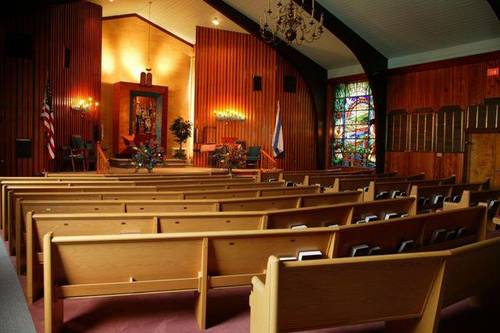
Temple Beth Shalom’s history began in 1953 when a visionary group of Jewish men and women gathered to organize the Jewish Center of the Mahopacs. While seeking a permanent site on which to build a synagogue and community center, they began holding religious services in local restaurants, clubhouses and a small building. A welcome hand was also extended by the Rev. Joseph Ingraham of the United Methodist Church, where free space was offered to the wandering congregation. In short order, this ambitious, talented and dedicated group of founding members formed a sisterhood, junior and senior youth groups and adult education classes.
On August 19, 1957, groundbreaking ceremonies were held for construction of a permanent house of worship at its present site at Croton Falls Road and Route 6 in Mahopac. As fundraising activities advanced, so did plans for the new temple. By 1958, Temple Beth Shalom and the Jewish Center of the Mahopacs had become a reality with dedication ceremonies scheduled for the July Fourth weekend. The gala weekend was highlighted by a formal dedication dinner featuring a string ensemble and entertainment by Yiddish theatrical star Molly Picon and her husband, Jacob Kalich. A toast was made with wine imported from the new state of Israel, and by all accounts, it was a night to remember! In the summer of 1958, the first service was held in the sanctuary.
The rabbi with the longest tenure was Rabbi Philip Fleischer, who actually served two stints as spiritual leader. Rabbi Fleischer’s retirement in 1996 set the stage for the British invasion, the arrival of Rabbi Colin Brodie, whose wife Amanda, also became ordained as a rabbi during Rabbi Brodie’s tenure. After Rabbi Brodie’s five-year tenure, the temple continued providing Shabbat services under the leadership of alternating rabbinical interns. That year demonstrated how egalitarian TBS had become: Elaine Jacobs was succeeded by Ellen Gershman as president; and TBS’ governance, made up of officers and trustees, was heavily female, as was our staff, committee chairs and religious school director.
Four additional rabbis followed as spiritual leaders of the congregation, each making their mark in raising Temple Beth Shalom’s offerings not only to the congregation but also to the greater community. In fact, the temple, once power was restored in the aftermath of Super Storm Sandy, became a service area for water and rest for anyone who had not yet regained electricity.
Today, Temple Beth Shalom is grateful to have Rabbi Sarah Freidson, TBS’ Chai (18th) Rabbi, serve as spiritual leader as the temple continues to reach out to its congregation, to the Jewish population in Putnam, northern Westchester and southern Dutchess counties and to the broad Mahopac community.
